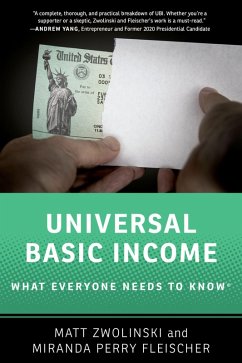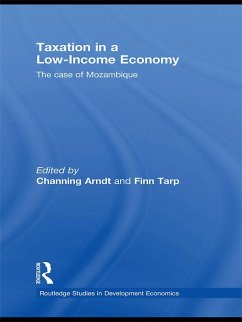
Universal Basic Income (eBook, PDF)
What Everyone Needs to Know®
Versandkostenfrei!
Sofort per Download lieferbar
8,95 €
inkl. MwSt.
Weitere Ausgaben:

PAYBACK Punkte
4 °P sammeln!
From Finland to Kenya to Stockton, California, more and more governments and private philanthropic organizations are putting the idea of a Universal Basic Income to the test. But can the reality live up to the hype? The motivating idea of a Universal Basic Income (UBI) is radically simple: give people cash and let them do whatever they want with it. But does this simple idea have the potential to radically transform our society? Is a UBI the ultimate solution to the problem of poverty? Is it the solution to automation-induced unemployment? Can it help solve gender and racial inequality? This ...
From Finland to Kenya to Stockton, California, more and more governments and private philanthropic organizations are putting the idea of a Universal Basic Income to the test. But can the reality live up to the hype? The motivating idea of a Universal Basic Income (UBI) is radically simple: give people cash and let them do whatever they want with it. But does this simple idea have the potential to radically transform our society? Is a UBI the ultimate solution to the problem of poverty? Is it the solution to automation-induced unemployment? Can it help solve gender and racial inequality? This book provides the average citizen with all the information they need to understand current debates about the UBI. It recounts the history of the idea, from its origins in the writings of 18th century radical intellectuals to contemporary discussions centered on unemployment caused by technological advances such as artificial intelligence. It discusses current pilot programs in the United States and around the world, including how much (or little) we can learn from such experiments about how a large-scale UBI would fare in the real world. It explores both the promises and pitfalls of a UBI, taking seriously the arguments of both supporters and detractors. It also explains why the UBI has attracted supporters from all across the ideological spectrum--from conservatives to liberals, libertarians to socialists--and what the implications of this fact are for its political future. How much would a UBI cost? Who would be eligible to receive it? Would it discourage work? Would people squander it on drugs and alcohol? Would it contribute to inflation? And how is it different from existing social welfare programs? This book provides an objective, expert guide to these questions and more, and is essential reading for anyone seeking to understand what could be the 21st century's most important public policy debate.
Dieser Download kann aus rechtlichen Gründen nur mit Rechnungsadresse in A, B, BG, CY, CZ, D, DK, EW, E, FIN, F, GR, HR, H, IRL, I, LT, L, LR, M, NL, PL, P, R, S, SLO, SK ausgeliefert werden.













